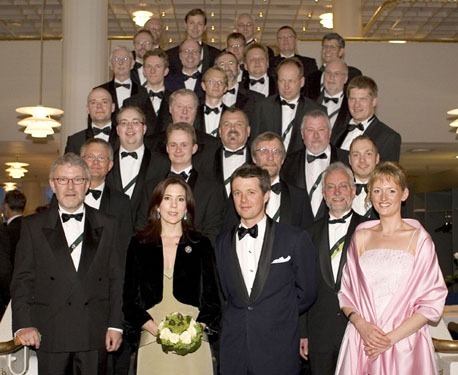Marc Abrahams's Blog, page 585
March 22, 2012
Computing Gibberish (part 2)
#2 'Implementing a Jabberwocky Gibberish Generator'.
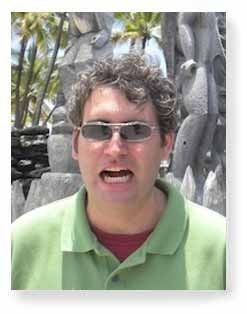 In contrast to some computer-programme developers who create gibberish by jumbling word-orders (see Computing Gibberish (part 1)) others take a different approach, and scramble the letters of English words (somewhat) to generate pronounceable nonsense words, known as pseudowords or logatomes, similar to those found in ' Jabberwocky' by Lewis Carroll.
In contrast to some computer-programme developers who create gibberish by jumbling word-orders (see Computing Gibberish (part 1)) others take a different approach, and scramble the letters of English words (somewhat) to generate pronounceable nonsense words, known as pseudowords or logatomes, similar to those found in ' Jabberwocky' by Lewis Carroll.
Mark Goadrich – Assistant Professor and the Broyles Eminent Scholars Chair in Computational Mathematics at the Centenary College of Louisiana, explains how one might devise such a creation using three probabilistic models of word creation that become progressively more accurate - here.
The professor has kindly supplied Improbable with a selection of auto-generated gibberish, which we have crafted into a short free-verse poem entitled 'Dilutivenefistreastackneericalized'.
* * *
"Eupher were the electroloes,
Acque zippinked the doons,
Travisonalight timensionster,
Ence bumpets, offismand."
* * *
The article (CSC207 – Lab 12 Gibberish Generator) is published in the Journal of Computing Sciences in Colleges, Volume 26 Issue 5, May 2011.
MULTIMEDIA GIBBERISH BONANZA!
• Sir Ian Mckellen recites Jabberwocky.
• Marianne Faithfull sings 'Jabberwoc'. [sic] •
• 30 minutes (or so) of gibberish, provided in CD format, just $16.98 from discovermeditation.com.
• A gibberish video from the Laughter Yoga Institute.
• An explanation of nuclear power from Henry Sthimblethrow of the International Atomic Research Association.
This concludes Improbable's short series on 'Computing Gibberish'.
Ritual Cleaning and Brain Eating Amoeba?
This week's topic for the Philosopher's Brain Lunch Debate is: Is ritual cleansing a missing link between fatal infection and brain eating amoeba? The debate is sparked by the sudden appearance of the following study:
"Is ritual cleansing a missing link between fatal infection and brain eating amoeba?" Ruqaiyyah Siddiqui and Naveed Ahmend Khan, Clinical infectious Diseases, epub 2012.
(Thanks to investigator Ivan Oransky for bringing this to our attention.)
Dr Moi and the fateful inflatable doll: Coming to Denmark
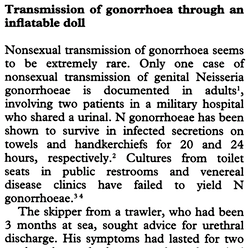 The photo below shows Dr. Harald Moi giving his acceptance speech at the 1996 Ig Nobel Prize Ceremony. Dr. Moi and Ellen Kleist were honored that year for their cautionary medical report "Transmission of Gonorrhea Through an Inflatable Doll."
The photo below shows Dr. Harald Moi giving his acceptance speech at the 1996 Ig Nobel Prize Ceremony. Dr. Moi and Ellen Kleist were honored that year for their cautionary medical report "Transmission of Gonorrhea Through an Inflatable Doll."
Dr. Moi will discuss details at the shows in Aarhus (on Monday and Tuesday, March 26) and Odense (on Wednesday, March 27) — all part of this year's Ig Nobel Tour of Scandinavia.
He will also answer a limited number of questions.
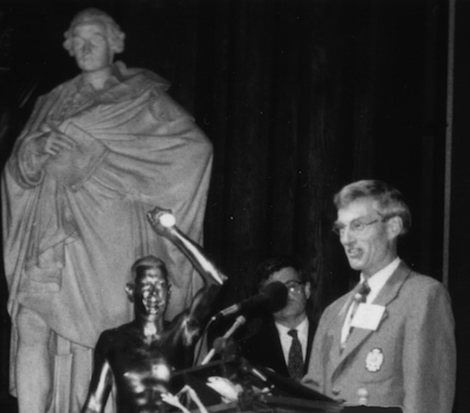
BONUS: At the shows in Aarhus, Dr. Moi will be feted by the Aarhus Student Singers:
Parker surges with the authorship lead: 1,050,000 and rising
 Professor Philip M. Parker [pictured here] has now authored more than 1,050,000 books, according to a report by Caitlan Carroll for the "Marketplace" radio program. This new total should erase most doubts as to whether he is the most prolific author ever.
Professor Philip M. Parker [pictured here] has now authored more than 1,050,000 books, according to a report by Caitlan Carroll for the "Marketplace" radio program. This new total should erase most doubts as to whether he is the most prolific author ever.
When we reported about Professor Parker in 2008, he was up to only about 85,000 books. Two years later he was over the 90,000 mark.
If the new report is correct, he has clearly upped his game.
(Thanks to investigator Julia Lunetta for bringing this to our attention.)
March 21, 2012
Optimum temperature for using a banana to drive a nail
Of the many people who have tried to use a banana to drive a nail, some have experimented to find the optimum temperature for the procedure to procede as desired. Here is a writeup, in Japanese, of one such attempt.
(HT Ralph Dearing_
What's it take to tip over an island?
If you add lots of people to a large island, will that island tip over? US Congressman Hank Johnson raised the question, and then debated himself, in an official hearing in May 2010. (Thanks to investigator Sarah Constantine for bringing this to our attention.) The island in question is Guam. This video documents the self-debate:
BONUS: There are many news reports about this. Here's one by CBS.
Septipus?
Whither a seven-armed octopus? Wonder whether it's a case of wither? So does the author of this study:
"An Octopus With Only Seven Arms: Anatomical Details," Ian G. Gleadall, Journal of Molluscan Studies, Volume 55, Issue 4. 1989, pp. 479-487. The author, at School of Medicine Tohoku University Seiryo cho Sendai, Japan, reports:
"A male specimen of Octopus is described which has only seven arms: the fourth right arm is congenitally absent. Dissection reveals that, as in normal octopuses, eight brachial nerves arise from the brain. However, right brachial nerves 2, 3 and 4 are connected by unusually short lengths of the interbrachial commissure, distal to which right brachial nerves 3 and 4 run together, with corresponding arteries, into the third right arm. Hectocotylization of the latter confirms that it is the fourth right arm which is missing. Other abnormalities of the specimen include an obviously asymmetrical funnel organ and three pairs of conjoined suckers."
(Thanks to investigator Kurt Verkest for bringing this to our attention.)
Ig Nobel in Stockholm Saturday night!
 Join us at the Ig Nobel show this Saturday, March 24, at 4:00 pm. at the Karolinska Institute in Stockholm. This is the first event on the 2012 Ig Nobel Tour of Scandinavia. Here are details, in the words of the Karolinska Institute:
Join us at the Ig Nobel show this Saturday, March 24, at 4:00 pm. at the Karolinska Institute in Stockholm. This is the first event on the 2012 Ig Nobel Tour of Scandinavia. Here are details, in the words of the Karolinska Institute:
IgNobel
2012-03-24 | Time: 16.00
Location: Karolinska Institutet, Berzelius väg 3, lecturehall Jacob Berzelius
Meet Marc Abrahams, founder of the IgNobel prize
Want to know more about how herring communicate by farting and why chickens prefer beautiful people? Then come to Karolinska Institutet in Stockholm on Saturday 24 March to hear some of the IgNobel laureates talk about their research. Also attending will be the father of the prize, Marc Abrahams, editor-in-chief of the Annals of Improbable Research (AIR).
The IgNobel Prize is a play on the word ignoble (dishonourable and unworthy) and was first awarded in 1991 in recognition of research of the more unusual, creative kind. It is awarded annually in ten different fields, including the conventional categories of the Nobel Prize proper. Far from denigrating its recipients work, the prize is usually received with humour and appreciation. According to the organisers, the aim of the prize is to first make people laugh, and then make them think.
The current lectures are co-arranged by the Swedish sceptic organisation Vetenskap & Folkbildning and Karolinska Institutet, and are part of the AIR lecture tour of Scandinavia.
Speakers
Marc Abrahams is founder and editor-in-chief of the humorous and satirical scientific journal, The Annals of Improbable Research. He is also the father of the IgNobel Prize and an author, journalist and speaker.
Magnus Wahlberg and Håkan Westerberg, who received the 2004 IgNobel Prize in Biology for their research on how herring communicate by farting. Magnus Wahlberg is currently researching at the University of Southern Denmark and the Fjord and Baelt Centre. Håkan Westerberg works at the fresh water laboratory at the Swedish University of Agricultural Sciences (SLU).
Magnus Enquist is professor of ethology at Stockholm University. He received the 2003 IgNobel Prize in Interdisciplinary Research for a study of how chickens prefer beautiful people.
March 20, 2012
Politeness: Is there an East-West divide?
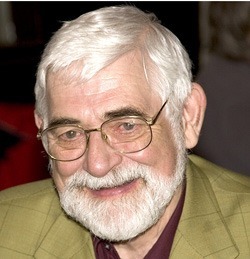 "East is east and west is west", a simple statement, does not logically exclude the possibility that east is also west and that west is also east. Geoffrey Leech [pictured here] makes part of the case, politely, in his study:
"East is east and west is west", a simple statement, does not logically exclude the possibility that east is also west and that west is also east. Geoffrey Leech [pictured here] makes part of the case, politely, in his study:
"Politeness: Is there an East-West divide?" Geoffrey Leech, Journal of Politeness Research. Language, Behaviour, Culture, vol. 3, no. 2, July 2001, pp. 167–206. The author, at Lancashire University, UK (of whom the journal informs us that "He has recently lectured on politeness in China, Japan, Korea and other countries") explains:
"Is there an East-West divide in politeness?This article presents… a Grand Strategy of Politeness (GSP)… The following hypothesis will be put forward, and supported by evidence from four languages: that the GSP provides a very general explanation for communicative politeness phenomena in Eastern languages such as Chinese, Japanese and Korean, as well as in Western languages such as English…. [This] article argues in favour of the conclusion that, despite manifest differences, there is no East-West divide in politeness."
Computing Gibberish (part 1)
#1, 'Generative Text Generation' Daniel Shiffman is Assistant Arts Professor at the Interactive Telecommunications Program at NYU's Tisch School of the Arts. The professor has developed a Markov chain-based Generative Text computer programme which he describes (and provides the code for) here. The programme is able to generate English text which appears at first glance to make sense, but in reality has more in common with 'context-free-grammar' or, as some might say, gibberish. It should be noted that the words themselves are not altered from the original standard English, but the order in which they appear is unconventional. Here is an example 'poem'
Daniel Shiffman is Assistant Arts Professor at the Interactive Telecommunications Program at NYU's Tisch School of the Arts. The professor has developed a Markov chain-based Generative Text computer programme which he describes (and provides the code for) here. The programme is able to generate English text which appears at first glance to make sense, but in reality has more in common with 'context-free-grammar' or, as some might say, gibberish. It should be noted that the words themselves are not altered from the original standard English, but the order in which they appear is unconventional. Here is an example 'poem'
* * *
Nonsense, Matriona will feed it.
It is always either vodka or brandy.
Yet I am sorry to leave.
You should not handle youthful egoism so roughly, sister.
What did I hurt my poor boy?
No, indeed, are ambition; for the first day.
Yes, they are singing across the water.
It is like a beggar beneath your window.
* * *
Coming soon: Computing Gibberish (part 2)
Bonus : Here are gibberish exponents extraordinaire Eric (Monty Python) Idle and colleague Henry Woolf explaining things on Rutland Weekend Television. (circa. Nineteen seventy five and a half):
Marc Abrahams's Blog
- Marc Abrahams's profile
- 14 followers


